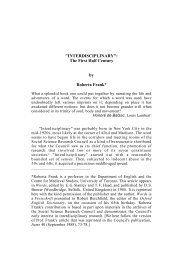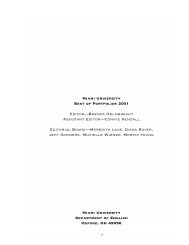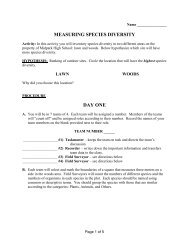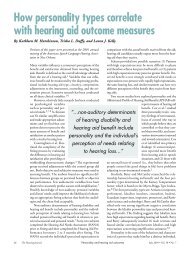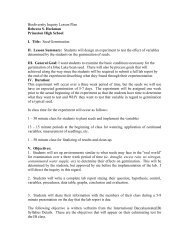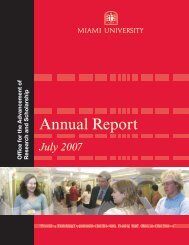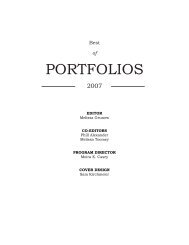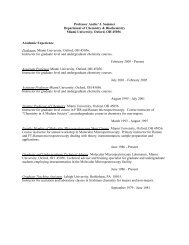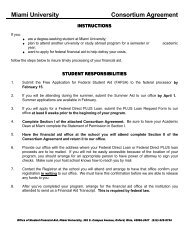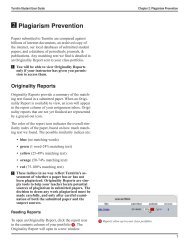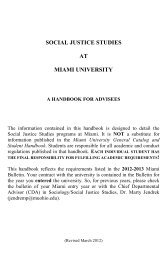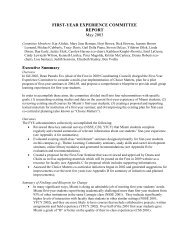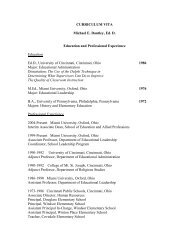Interdisciplinary Research Manual - Units.muohio.edu
Interdisciplinary Research Manual - Units.muohio.edu
Interdisciplinary Research Manual - Units.muohio.edu
You also want an ePaper? Increase the reach of your titles
YUMPU automatically turns print PDFs into web optimized ePapers that Google loves.
39<br />
topics, issues, and positions are more complicated than they appeared when you skimmed<br />
through them, but it’s much easier to make a simple structure more complicated than to<br />
try to construct a complicated structure all at once from the full set of details. Like many<br />
other parts of the senior project research process, understanding, organizing, and<br />
evaluating the topics, issues, and positions don’t scale up well. Trying to absorb that<br />
information all at once works on a smaller scale, but not on a project of this magnitude.<br />
There are too many topics, issues, and positions to keep in your head all at once, much<br />
less sort them out, evaluate them, and organize all those details into an argument that<br />
draws on several different disciplines.<br />
Reading for the chapter. After doing more skimming than reading for your<br />
annotated bibliography and literature review, you now get a chance to dig into the books<br />
that pertain to this chapter and then pursue those ideas further into journal articles. Even<br />
now, however, you should not be reading books cover-to-cover. Be strategic in choosing<br />
what and how much to read. Remind yourself before you open a book why you are<br />
reading it and what you expect it to contribute to your chapter. Then find the sections of<br />
the book that contain what you need and read only those sections. Keep in mind what you<br />
are looking for as you read. In short, read for your purposes not the author’s purposes.<br />
Authors want you to see the section you read as embedded in their overall argument, but<br />
you should see it as embedded in your argument. Remember that you do not have time in<br />
two semesters, not even in two five-credit courses, to read completely the 45 books in<br />
your original annotated bibliography, much less the hundred or more books and journal<br />
articles you will probably end up using in your project.<br />
Journal articles give you the cutting edge of the professional debates revealed in<br />
books. They are much more focused, however, concentrating on individual mini-debates.<br />
They deal with a specific aspect of an issue, not the whole issue (even as perceived<br />
narrowly by that discipline), with a sub-topic not the whole topic. The analysis is less<br />
synoptic and comprehensive, more fine-grained and focused. Journal articles give you<br />
greater detail, they fill in gaps, and they bring the arguments up to date. If you were to<br />
start with journal articles instead of books, you would get lost in an intellectual thicket;<br />
but once you have used books to survey the intellectual landscape you can appreciate the<br />
nuance, detail, and depth that the journal literature provides. The journal literature is<br />
useful for most projects only after you learn through books what the larger conversations<br />
are about and you figured out through the literature review how to situation your project<br />
relative to those conversations. The exceptions are projects on topics so recent—dealing<br />
with breakthroughs in computing, for example—that there has not been time for books to<br />
be written on those topics, or projects on topics such as the Web where many authors<br />
prefer another medium to books.<br />
It is easy to be captured by the materials from which you draw. If you are drawing<br />
from a number of sources that all treat your topic the same way or put it in a certain light,<br />
it’s easy to be swept up by group think and unconsciously assume that you have to write<br />
about it that way too. Again, you need to remind yourself that you are writing for a<br />
different purpose that any one else who has written on your topic. Ask yourself what<br />
treatment of your topic makes sense for an interdisciplinary approach—make problematic<br />
the way the rest of literature treats your topic, instead of accepting their way uncritically.<br />
It becomes harder and harder to find something new as you examine more and<br />
more books on a topic. After a while, you don’t need to read a book to know what’s in it;



